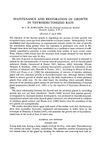 1 citations,
January 2022 in “Transgender health”
1 citations,
January 2022 in “Transgender health” Hormone therapy in transgender individuals can increase acne and affect hair growth and loss.
 1 citations,
July 2011 in “Climacteric”
1 citations,
July 2011 in “Climacteric” Long-term estrogen therapy in postmenopausal women can improve certain health markers, hair loss is common regardless of hormone use, stopping estrogen doesn't increase breast cancer risk, smoking does, and a balanced BMI is linked to lower mortality.
 1 citations,
March 2011 in “Infertility”
1 citations,
March 2011 in “Infertility” Hormone imbalances from the pituitary, thyroid, and adrenal glands can cause infertility, but treating these disorders can improve fertility.
 July 2024 in “Journal of Pediatric Endocrinology and Metabolism”
July 2024 in “Journal of Pediatric Endocrinology and Metabolism” Ovarian hyperthecosis should be considered in young women with severe male-like symptoms and can be managed with hormone treatments.
 April 2024 in “International journal of medical science and clinical research studies”
April 2024 in “International journal of medical science and clinical research studies” Effective acne management in PCOS includes hormone therapy, metformin, isotretinoin, weight loss, diet, exercise, and personalized treatment plans.
 October 2023 in “Journal of the Endocrine Society”
October 2023 in “Journal of the Endocrine Society” A woman was diagnosed with Sheehan's syndrome and a rare complication of diabetes insipidus 33 years after symptoms began, improving with hormone therapy.
 February 2013 in “Journal of The American Academy of Dermatology”
February 2013 in “Journal of The American Academy of Dermatology” Hair loss is a common, often overlooked side effect of hormone treatments for breast and prostate cancer.
 August 2009 in “International Journal of Dermatology”
August 2009 in “International Journal of Dermatology” A postmenopausal woman's facial redness, acne, and excess hair were caused by too much hormone therapy for insomnia, but improved after stopping the treatment.
 September 1999 in “The Journal of The British Menopause Society”
September 1999 in “The Journal of The British Menopause Society” The document concludes that skin aging in women can be caused by UV exposure and hormonal changes, and treatments like hormone replacement therapy and various skin therapies can help.
 124 citations,
June 2002 in “Best Practice & Research Clinical Endocrinology & Metabolism”
124 citations,
June 2002 in “Best Practice & Research Clinical Endocrinology & Metabolism” Polycystic Ovary Syndrome likely starts in childhood and may be genetic and influenced by early hormone exposure.
 77 citations,
March 2021 in “Nature”
77 citations,
March 2021 in “Nature” Stress hormone corticosterone blocks a growth factor to slow down hair stem cell activity and hair growth.
 52 citations,
June 2013 in “The Journal of Clinical Endocrinology and Metabolism”
52 citations,
June 2013 in “The Journal of Clinical Endocrinology and Metabolism” The research found that anovulatory young women have higher androgen and hormone levels than those who ovulate, suggesting immature hormonal regulation rather than a specific condition.
 49 citations,
May 2018 in “Endocrine”
49 citations,
May 2018 in “Endocrine” Women with regular menstrual cycles and PCOS have linked kisspeptin and LH hormone patterns, unlike those with irregular cycles.
 19 citations,
January 2019 in “Ginekologia Polska”
19 citations,
January 2019 in “Ginekologia Polska” The combined Myo-inositol and D-chiro-inositol treatment improved weight, hormone levels, and skin conditions in women with PCOS.
 14 citations,
December 1998 in “The Journal of Clinical Endocrinology and Metabolism”
14 citations,
December 1998 in “The Journal of Clinical Endocrinology and Metabolism” MENT could be a better option than testosterone for male hormone therapy and birth control because it works well at lower doses and has fewer side effects on the prostate.
 13 citations,
March 2014 in “Cutaneous and Ocular Toxicology”
13 citations,
March 2014 in “Cutaneous and Ocular Toxicology” Oral isotretinoin for severe acne can change hormone levels but does not significantly affect ovarian function.
 9 citations,
November 2015 in “Gynecological Endocrinology”
9 citations,
November 2015 in “Gynecological Endocrinology” Different types of PCOS in Chinese Han women show varying levels of male hormone and metabolic issues.
 8 citations,
March 1942 in “Journal of Endocrinology”
8 citations,
March 1942 in “Journal of Endocrinology” Thyroid hormone treatments help thyroidectomized rats grow normally.
7 citations,
May 2021 in “General and comparative endocrinology” Muskoxen's qiviut cortisol levels indicate their stress hormone activity over the hair growth period.
 7 citations,
August 2019 in “Journal of Ovarian Research”
7 citations,
August 2019 in “Journal of Ovarian Research” Blood removal and birth control pills both helped with hormone levels in women with PCOS, but birth control was better for regular periods and blood removal had fewer side effects.
 7 citations,
June 1994 in “Journal of The American Academy of Dermatology”
7 citations,
June 1994 in “Journal of The American Academy of Dermatology” Obesity may contribute to female hair loss by increasing male hormone levels that affect hair follicles.
 3 citations,
January 2024 in “Liver International”
3 citations,
January 2024 in “Liver International” Targeting thyroid hormone receptor α in liver cells may help treat liver fibrosis.
 October 2023 in “Journal of the Endocrine Society”
October 2023 in “Journal of the Endocrine Society” Losing weight and taking birth control pills can greatly improve severe male hormone excess in women with PCOS.

Resveratrol improved hormone levels, menstrual cycles, hair loss, and ovarian function in PCOS patients.
 June 2019 in “The Medical journal of Basrah University”
June 2019 in “The Medical journal of Basrah University” Laparoscopic ovarian drilling helps infertile women with PCOS by improving menstrual regularity, ovulation, and chances of conception, and by changing hormone levels.
 June 2021 in “Archives of Advances in Biosciences”
June 2021 in “Archives of Advances in Biosciences” Finasteride reduces sperm count and quality and alters hormone levels in mice.
 99 citations,
August 2003 in “Fertility and Sterility”
99 citations,
August 2003 in “Fertility and Sterility” Too much male hormone is the main cause of Polycystic Ovary Syndrome.
 98 citations,
July 2014 in “Trends in Molecular Medicine”
98 citations,
July 2014 in “Trends in Molecular Medicine” Hair follicles are hormone-sensitive and involved in growth and other functions, with potential for new treatments, but more research is needed.
39 citations,
November 1990 in “The Journal of Steroid Biochemistry and Molecular Biology” Antiandrogens help treat hormone-related conditions in both men and women.
32 citations,
March 2013 in “EMBO journal” The plant hormone auxin activates the TOR pathway, affecting gene expression related to growth and cell size.



























